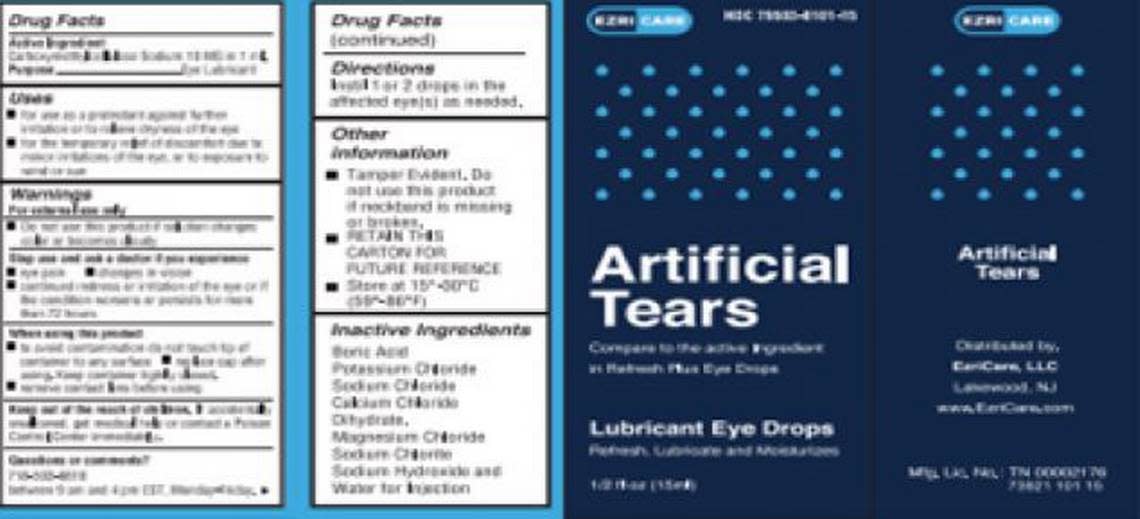A Miami lawsuit blames loss of a woman’s eye on Leon Medical, artificial tears makers
A lawsuit by a Miramar woman claims she lost her right eye and is now legally blind after a bacterial infection caused by artificial tears linked to an outbreak of that bacterial infection.
Clara Olivia’s lawsuit also claims that she had to switch to EzriCare Artificial Tears because that brand was “provided,” by Doral’s Leon Medical Center’s insurance arm, HealthSpring.
Both Leon Medical Center and HealthSpring are defendants in the lawsuit, along with Global Pharma Healthcare, the India-based company which made the artificial tears; and the companies involved in the importing, distribution and selling of the artificial tears, EzriCare; EzriRx; and Aru Pharma.
The suit was filed Tuesday in the 11th Judicial Circuit for Miami-Dade County by Ryan Yaffa of the Coral Gables’ firm Grossman, Roth, Yaffa and Cohen.
None of the defendants have responded to emails or calls from the Miami Herald.
Artificial tears and a real problem
Eye medicines have been the Silicon Valley Bank of the drug industry with four FDA-posted recalls in the last month. Purely Soothing eye drops got recalled for a lack of sterility. Cracked caps might affect the sterility in Brimonidine Tartrate Ophthalmic Solution, recalled by Weston’s Apotex.
But, the major recalls came from Global Pharma, which yanked all lots of EzriCare and Delsam Pharma Artificial Tears (carboxymethylcellulose sodium) Lubricant Eye Drops after a CDC investigation into an outbreak of “extensively drug-resistant strain of pseudomonas aeruginosa.”
Global later recalled Delsam Pharma eye ointment also.
“Most patients reported using artificial tears,” the CDC’s outbreak investigation says. “Patients reported over 10 different brands of artificial tears, and some patients used multiple brands. EzriCare Artificial Tears, a preservative-free, over-the-counter product packaged in multidose bottles, was the brand most commonly reported. This was the only common artificial tears product identified across the four healthcare facility clusters.”
Olivia’s lawsuit quotes an EzriCare statement from Feb. 1, the day the CDC first announced the outbreak, as saying, “As of today, we are not aware of any testing that definitively links the...outbreak to EzriCare Artificial Tears. Nonetheless, we immediately took action to stop any further distribution or sale of EzriCare Artificial Tears. To the greatest extent possible, we have been contacting customers to advise them against continued use of the product.”

EzriCare, EzriRx Aru Pharma and Walmart were defendants in a February federal court lawsuit filed in Florida by Coral Gables attorney Rebecca Vinacour and Houston’s Jory Lange of The Lange Law Group for Starke resident Teresa Phillips. Phillips lawsuit claims she got a pseudomonas aeruginosa infection from EzriCare’s artificial tears.
At the CDC’s last update, the outbreak has hit 64 people in 13 states: Florida, California, Texas, New York, Colorado, Connecticut, Illinois, New Jersey, New Mexico, Nevada, Utah, Washington and Wisconsin. Of the 64, 37 were in four healthcare facility clusters. One person has died and there have been eight reports of people who’ve lost their vision.
Olivia’s lawsuit says she should be included in that number.
Unwillingly giving up a right eye
The lawsuit claims that Olivia, 68, used contact lenses for 30 years, which caused dry eyes. She dealt with that problem by using eye drops she got through HealthSpring’s insurance plan along with the contact lenses she got from Leon Medical Center.
“HealthSpring typically provided Olivia with lubricant eye drops manufactured by a company known as Bausch + Lomb,” the lawsuit says. “However, in May 2022, Olivia noticed that the eye drops authorized by her insurer had changed. This time, she was provided with EzriCare Artificial tears.”
On Aug. 1, with her right eye “noticeably red, swollen and abnormally watery,” a Leon Medical ophthalmologist and others told Olivia she had a scratch on her cornea. Three days of antimicrobial and antibiotics didn’t keep the eye from getting worse, the lawsuit said, so Olivia went to Bascom Palmer Eye Institute on Aug. 4.
Doctors there increased the strength and frequency of the drugs already prescribed and did an exam that found a “confluent peripheral corneal ulcer.” A diagnostic cornea scrape was done. Three days later, the lawsuit said, an exam showed Olivia’s vision decreasing and the size of the ulcer had increased. A fungus had joined the ulcer. Doctors added antifungal and antiviral medications.
When Olivia went back to Bascom Palmer on Aug. 10, the lawsuit said, she was told the cultures taken on Aug. 4 showed “moderate growth of pseudomas aeruginosa.”
A change of treatment didn’t stop the problem, the lawsuit said. Doctors tried a penetrating keroplasty, a cornea transplant, on Aug. 29. But, during the operation, “the surgeon observed scleral abscesses” that prevented safe removal of the cornea. The surgery was ended.
The lawsuit said doctors the day of the aborted surgery and two ophthalmic plastic and reconstructive surgery specialists seen over the next few days had the same opinion: with what had already happened in the right eye, the treatment already tried and “the risk of the infection spreading systematically creating a life-threatening condition,” taking Olivia’s right eye out was the best option.
“On Sept. 1, 2022, Olivia’s right eye was surgically removed and replaced with a plastic implant,” the lawsuit said. “Given her decreased visual acuity of 20/200 in her remaining left eye, Olivia is now legally blind.”
